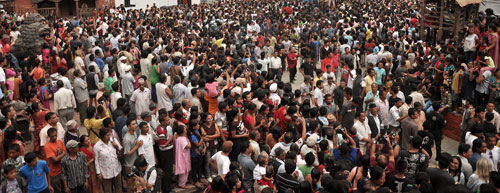 BIKRAM RAI |
When the Central Bureau of Statistics released the preliminary results of the 2011 census this week, many of us were pleasantly surprised that the country's runaway population growth rate has sunk dramatically to 1.4 percent per year. Nepal's population, which we all expected to touch 30 million this time was "only" 26.62 million.
But analysing the figures further and speaking with experts, we now see no reason to rejoice. Apart from some doubts about the accuracy of the numbers, there are unmistakable trends that point to a dangerous demographic imbalance.
The most serious of these is a rapid depopulation of the hills nationwide. Twenty-three districts have negative population growth, with most of the people moving to the capital Valley and plains. At no time in Nepal's history, not even during the state-sponsored transmigration from hills of Tanahu, Parbat, Kaski to Chitwan during the Mahendra years, has there been such a large scale movement of Nepalis within Nepal.
Manang has lost an astonishing one-third of its population in the last 10 years. Khotang, Terathum and Syangja are also suffering out migration of young men to the cities, to Malaysia and the Gulf. The mid-western hills have seen depopulation that hasn't abated since the conflict years.
Higher birth rates in the Tarai, and migration from the hills and from across the border, means that the population of the Tarai grew by 20 per cent in the last 10 years so that more than half the country's population now lives in the plains. It was induced migration due to conflict, or distress migration because of hardships of subsistence farming in
the hills.
All this puts tremendous pressure on the land and resources of the Tarai. Meantime, with few young men left, the hills are full of fallow fields. The CBS admits there are nearly two million Nepalis "missing" in the census, because those who have been away for more than six months were not counted. Our guess is that the actual total is nearly double that, if one counts seasonal migrants to India. Which means the real population of Nepal is probably closer to the 30 million we had projected all along.
But even if the population growth rate is not 1.4 per cent, it has probably fallen considerably from the 2.25 per cent high in 2001. A more indicative figure would be the fertility rate. Falling birth rates and death rates will bring population growth down further in future. But what will our demographic transition mean for our democratic transition?
The baby boomer generation has created a huge youth bulge, adding 400,000 people to the labour force every year. Most are moving away from agriculture. Only half of them migrate every year for jobs abroad, what is the other half going to do?
In New York last week, Prime Minister Baburam Bhattarai committed himself to a "Marshall Plan" for decentralised job creation through massive investments in infrastructure. It is a noble thought, and probably the only way to go.
But no prime minister of Nepal, however visionary or honest, can work on these long-term plans if he is so beset with short-term threats to his government's survival. Prime Minister Bhattarai is on perpetual damage control mode, mostly trying to patch up the mess his colleagues in the coalition make every time they open their mouths.
We wish Bhattarai well this Dasain so he can address the twin challenges of keeping the country's demography and democracy on track, and keeping demagogues out.


